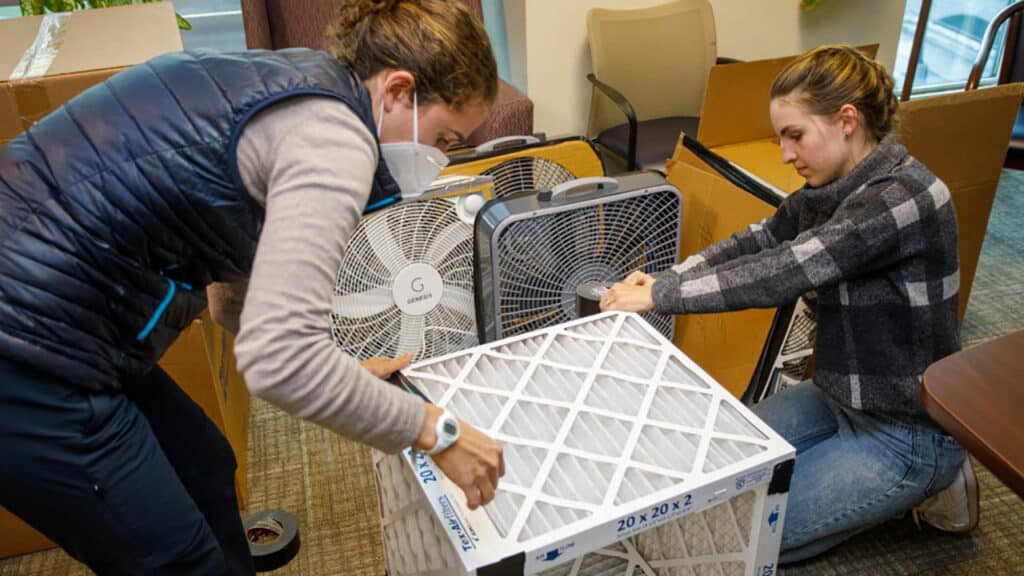The COVID-19 pandemic brought a new emphasis on indoor air quality. However, few studies have investigated the impact of air filtration, a COVID-mitigation approach, on indoor air concentrations of semi-volatile organic compounds.
A research team from Brown University’s School of Public Health, Brown’s School of Engineering, and Silent Spring Institute has found that simple, inexpensive “do-it-yourself” air filtration devices called Corsi-Rosenthal boxes are effective at reducing indoor air pollutants.
As part of a school-wide project, the DIY air filters were assembled and installed in the School of Public Health and other buildings on the Brown campus, and researchers measured their effectiveness at filtering out indoor air pollutants. The device managed to reduce the indoor air concentrations of commonly-found chemicals that pose risks to human health and are associated with various types of respiratory diseases caused not only by viruses but also by polluting agents.
The Corsi-Rosenthal boxes can be constructed from materials easily found at hardware stores: four MERV-13 filters, duct tape, a 20-inch box fan, and a cardboard box. To test the effectiveness of the air filters, the researchers compared the concentrations of semi-volatile organic compounds in a room before and during the box’s operation. The idea was to prove how the device could improve indoor air quality.

The results showed that the equipment was able to lower the concentration of various PFAS and phthalates in 17 rooms at the School of Public Health during the period they were used. PFAS, a type of synthetic chemical found in a range of products, including cleaners, textiles, and wire insulation, decreased by 40% to 60%; phthalates, commonly found in building materials and personal care products, were reduced by 30% to 60%.
PFAS and phthalates are linked to several health problems, including asthma, low birth weight, altered brain development in children, and some cancers. In addition, these pollutants have been associated with reduced vaccine response in children and also may increase the severity of and susceptibility to COVID-19 in adults.
“The reduction of PFAS and phthalate levels is a wonderful co-benefit to the Corsi-Rosenthal boxes,” said study co-author Robin Dodson, a research scientist at Silent Spring Institute and expert in chemical exposures in the indoor environment. “These boxes are accessible, easy to make, and relatively inexpensive, and they’re currently being used in universities and homes across the country.”
“The Corsi-Rosenthal box was designed to be a simple, cost-effective tool to promote accessible and effective air cleaning during the COVID-19 pandemic; the fact that the boxes are also effective at filtering out air pollutants is a fantastic discovery,” said Richard Corsi, one of the inventors of the boxes.
“This interesting research showing that the air filters not only reduce particles carrying the SARS-CoV-2 virus but also reduce other indoor air pollutants could be very significant as we continue to work to create a cleaner and safer indoor air,” said Jim Rosenthal, Corsi’s collaborator and CEO of Air Relief Technologies, the company that manufactures the MERV-13 filters used in Corsi-Rosenthal Boxes.
The team also found that the Corsi-Rosenthal boxes increase sound levels by an average of 5 decibels during the day and 10 decibels at night, which could be considered distracting in certain settings, such as classrooms. You can construct them quickly for about $100 per unit, with materials from the hardware store. They are not only highly effective but also scalable.
Journal reference:
- Robin E. Dodson, Katherine E. Manz, Shaunessey R. Burks, Richa Gairola, Nina F. Lee, Yun Liu, Kurt D. Pennell, Erica D. Walker, and Joseph M. Braun. Does Using Corsi–Rosenthal Boxes to Mitigate COVID-19 Transmission Also Reduce Indoor Air Concentrations of PFAS and Phthalates? Environmental Science & Technology, 2022; DOI: 10.1021/acs.est.2c05169
Simple, DIY air filters can help reduce exposure to indoor air pollutants
Source: Tambay News

0 Comments